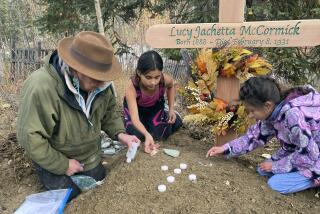‘Pilgrim’s Wilderness’ a harrowing tale of isolation
A self-proclaimed biblical prophet with a flowing gray beard and the name Papa Pilgrim shows up with his wife and 14 children in a bit of Alaskan wilderness so remote and austere it has driven all other settlers away. Even the native Ahtna people never wanted to live in the narrow defile between grinding glaciers and peaks that rise 16,000 feet.
The few residents of the nearby ghost town of McCarthy don’t know what to make of the Pilgrim family at first, and they don’t ask too many questions; whatever past drives someone to such cold isolation is a door best not to knock on.
Tom Kizzia, a reporter for the Anchorage Daily News, knocked and then pried it off the hinges with his darkly intriguing new book, “Pilgrim’s Wilderness: A True Story of Faith and Madness on the Alaska Frontier.” Papa Pilgrim, born as Bobby Hale in Fort Worth, has an unexpected and fascinating back story. Who in Alaska could have guessed he was implicated in a 1962 break-in of Judith Exner’s apartment as part of a scheme to blackmail President John F. Kennedy? Or that he went to school with Lee Harvey Oswald and John Denver? Or that he lived on land in New Mexico owned by Jack Nicholson?
All of this and the title of the book, however, doesn’t quite hint at the darkness of Pilgrim’s story, which we glimpse early on when he is alone with his first wife, as she somehow fatally shoots herself in the back of the head with a 20-gauge shotgun. And it gets only worse as he moves on to a new wife and family and seals them off from the outside world to rule as he sees fit. In one scene, he whips his sons over a barrel while forcing his wife to hold them, and if that weren’t sordid enough, he does this to secretly extort his oldest daughter into sleeping with him.
“Papa told her she was the one who could deliver them mercy,” Kizzia writes.
So despite last frontier similarities, this book is nothing like Jon Krakauer’s paragon work of reportage about Alaskan escapism and idealism-gone-awry. In “Into the Wild,” we prayed for Christopher McCandless to make it out alive. With Pilgrim, we pray for little more than an excruciating demise, nothing left but gnawed bones and bear scat, if only so his children can be safe and his wife doesn’t have to call him “Lord” anymore. But the tense desire for justice keeps the pages turning quickly through a broader, rich narrative of America groping to manage competing freedoms in that vast cold land where the last road ends.
The Wrangell backcountry around McCarthy once boasted the country’s richest copper mines, but it had long been abandoned to the wolves and bears and a few tough recluses, outlaws and fortune seekers. Though Congress declared it a national park in 1980, it never became a Yosemite or even a Denali. Just to get to McCarthy, once a boomtown of bootleggers and prostitutes supporting the miners up the valley, travelers had to follow the 60-mile gravel bed of an abandoned railroad, “a route frequently closed in winter by drifts and freeze-thaw flows of ice that locals attacked with chainsaws and winches,” then cross a footbridge across the icy Kennicott River. The Pilgrims bought an old 420-acre park inholding beyond that tenuous outpost, 13 miles up a trail from McCarthy that repeatedly crossed avalanche zones and frozen McCarthy Creek.
Kizzia writes that the area was “teetering nostalgically between the open frontier of the nineteenth century and the protected wilderness of the twenty-first.” The Pilgrims were the catalysts who would force it to fall to one way or another, when Papa decided to bulldoze a road to their land, squaring off with the federal government in an escalating situation that Alaskans feared could turn into their own Waco or Ruby Ridge. He briefly became a cause celebre for the property rights movement.
The standoff beamed light for the first time on this strange family cult in pioneer garb whose kids — with names like Psalm, Lamb and Bethlehem — had never seen a television but could come together with guitars, violins and fiddles and dance and sing country gospel.
The author was drawn to this story as a longtime journalist in Alaska who owned a cabin near McCarthy and had written about the locals’ attempt to keep the modern world at bay. Because of his tie to the area, Papa Pilgrim agreed to invite him up to the homestead during the standoff with the National Park Service.
Kizzia’s reporting deepened later as he began to investigate Pilgrim’s past in the Sangre de Christo Mountains of New Mexico, where the family got a $10-a-month lease from Nicholson to live on and look after land he had bought after making “Easy Rider.”
The children “tended flocks of sheep in alpine meadows, made their own buckskin, and lived pretty much as their forebears did a century ago, innocent and capable and strong, spinning wool and making lye soap and each night singing songs of praise.” It was a far from idyllic scene, as the neighbors began to detest them, Papa began drinking and the abuse of his children grew more depraved.
The narrative in “Pilgrim’s Wilderness” skips back and forth between Alaska and New Mexico in a way that is a little jarring in spots but generally allows morbid curiosity — who are these weird people? — to sustain the tension. Kizzia appears in parts and offers broader cultural commentary but mostly lets the Pilgrims’ story speak for itself.
The oldest daughter, Elishaba, born Butterfly Sunstar during her parents’ hippie stint, is the first to start questioning her dad, given the rank hypocrisy his sexual abuse of her revealed. Kizzia was able to interview her, and I assume he did everything possible to flesh out her personality, given his obvious skills in ferreting out sharp details and descriptions, right down to the etchings around Papa’s eyes. But Elishaba seems unformed and ambivalent in the book. This may just be who she was, given how she was raised. This is nonfiction after all. Still it’s a bit of a letdown for the reader, as the denouement she brings about, suspenseful as it is, falls a little flat emotionally.
But that is small trade-off since “Pilgrim’s Wilderness” is measured, painstakingly reported and gripping, giving us a true look at an escapist nightmare in America’s mythic and fading frontier.
Joe Mozingo is a Times reporter and author of “The Fiddler on Pantico Run: An African Warrior, His White Descendants, A Search for Family.”
Pilgrim’s Wilderness
A True Story of Faith and Madness on the Alaska Frontier
Tom Kizzia
Crown: 336 pp., $25
More to Read
Sign up for our Book Club newsletter
Get the latest news, events and more from the Los Angeles Times Book Club, and help us get L.A. reading and talking.
You may occasionally receive promotional content from the Los Angeles Times.







